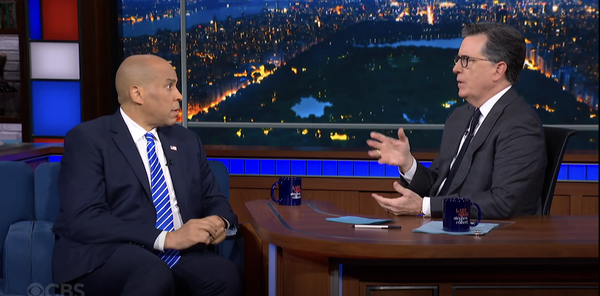Before making his record-breaking, 25-hour speech on the Senate floor, Cory Booker (D-NJ) said he dehydrated himself 24 hours earlier so he wouldn't need to go to the bathroom. But this preparation upset his mother, who worried what the lack of fluids would do to his health.
"She wasn't sure how long I could go, she just said 'Please tap out when you feel it,'" Booker said Monday on "The Late Show With Stephen Colbert." "But my mom has a saying, 'Behind every successful child is an astonished parent.' So, I was very happy to astonish her that I could go that long."
MORE: Cory Booker breaks record with 25-hour speech on the Senate floor
Booker broke the record for the longest Senate speech, previously held by former Sen. Strom Thurmond, who spent 24 hours and 18 minutes speaking against the Civil Rights Act in 1957. Booker said his speech showed how unsuccessful Thurmond's efforts were, seeing as "a Black guy came along and broke that record."
In his speech, Booker spoke against many of President Donald Trump's policies, and urged his Democratic colleagues to do more to protect Americans. Speaking to Colbert, Booker called Trump a demagogue — a political leader who gains support by appealing to people's prejudices.
"It was a very healing process, in many ways for myself, to say plainly, 'We have not done enough. I have not done enough,'" Booker said. "The Democratic Party must accept responsibility, not for complicity, but for contributing to the pathway to this kind of demagoguery, to this kind of person being in the White House.'"
Booker said everyday people also need to take action, as seen in nationwide protests against Trump and Elon Musk last weekend. He pointed to women's suffragette activist Alice Paul and the establishment of the Underground Railroad as moments where political change started from non-political leaders.
"Change has never come from Washington, it often comes to spite Washington and it comes to Washington by American people who are saying 'I am not satisfied with what's going on and I'm going to join a larger movement because it's a moral moment.'"
Watch the full interview below:


